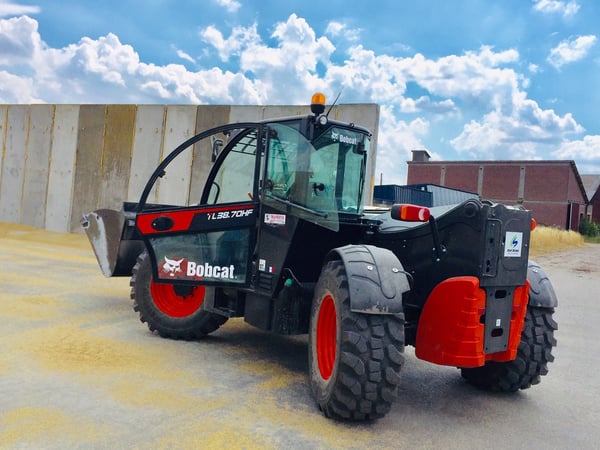How Radial Tires Can Improve the Performance of Your Construction Equipment
Compact construction equipment like backhoes, telehandlers, industrial tractors, and skid steers have traditionally been fitted with bias-ply tires, due in large part to their lower up-front cost. However, just because a tire costs less at the dealer, doesn’t mean it’s the most affordable option over the long haul. Radial tires have numerous advantages over their bias counterparts which allow them to last longer and perform better—reducing the tire’s expense over its lifetime and earning you more.

Here are nine ways that radials help boost construction businesses’ bottom lines.
Reduced Heat Build Up
Radial tires have a two-part construction. The weave of the body plies—layers of rubber-coated fabric—runs perpendicular from one bead to the other, resulting in a much more flexible sidewall. The body is then wrapped around the tread area (radially) by durable belts that create a stiffer reinforced footprint. Conversely, bias-ply tires are made using alternating plies, which are woven diagonally (or “on the bias”) from one bead to the other. Because radial construction eliminates alternating layers, which cause friction, there is less heat build up, leading to a longer-lasting tire.
Improved Contact Patch
The flexible sidewalls of a radial allow the tire to put a longer, wider contact patch on the ground, maximizing the performance of the tread, reducing wear, and more evenly distributing the weight of the machine.
More Efficient Machine Use
The larger footprint of a radial is key for the effective transmission of a machine’s horsepower to the ground. If you’re paying a premium for high-horsepower equipment but not putting all the power to the ground, you’re not taking full advantage of your investment.
Traction, Traction, Traction
A larger footprint that puts more of the tire’s tread on the ground equates to a tire with superior traction and less slip (which means reduced unnecessary wear). This bolsters machine versatility, allowing it to work on a variety of job sites including those with challenging conditions such as hilly terrain or mud.
Better Fuel Economy
Radials have roughly 20% less rolling resistance than bias tires (thanks to the way they’re built, which allows them to better dissipate heat) translating to less fuel consumption. The advantage is even greater when the fuel wasted through slipping is incorporated into the equation. The more miles a machine logs, the more benefit a radial will provide.
Tougher Tires
It’s common for radial tires to be built using super-strong steel belts underneath the tread area, making them more puncture resistant than a bias-ply tire. Tires such as the Alliance 550, 580, and 585 tires are steel belted for work in tough terrain. This is key for keeping machines running—making you money, not costing you money.
Nicer Ride
Radial tires offer a more comfortable ride for operators, thanks to their flexible, shock- and jolt-absorbing sidewalls. This results in happier, more productive, and profitable operators.
Easier on Equipment
The gentler ride delivered by radials doesn’t just benefit operators— it’s also easier on equipment, reducing wear and tear and saving you money on maintenance and replacement.
It All Adds Up
Despite the numerous benefits provided by radials, a large percentage of the construction market continues to use bias tires. Traditionally, the initial price of radials has been a barrier for construction business owners and fleet managers; it’s not uncommon for a radial tire to cost as much as three times more than an entry-level bias tire. With this in mind, we have worked to narrow the price gap between radial and bias tires. Our aggressively priced radials offer all the aforementioned benefits (including three times longer life span) for about the same price as a premium bias tire—leading to a tire that costs less over the long haul and making the decision to go radial a no-brainer.
Whether you’re operating your equipment on the road, in the mud, or through the snow, we have a radial tire for your machine. Contact your local Yokohama Off-Highway Tires' tire dealer or rep to find out more about our extensive line of radial tires for compact construction equipment.


